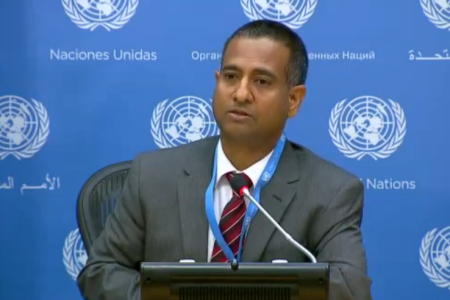Source: www.shaheedoniran.org

The Special Rapporteur submits the present report, his sixth to the General Assembly, pursuant to Human Rights Council resolution 31/19. In his report the Special Rapporteur primarily presents information gathered from government sources and relayed by alleged victims of rights violations as well as civil society actors located inside and outside the country.
Reports received by the Special Rapporteur suggest that at least 72 Baha’is were being detained as of 8 June 2016 in connection with the peaceful exercise of their faith. In addition to reports of arbitrary arrests, detentions and prosecutions, the Special Rapporteur continues to receive troubling reports that the authorities continue to pursue activities that deprive Baha’is of their right to work, reportedly in line with a directive issued by the Supreme Council of the Cultural Revolution in 1991. These policies restrict the types of businesses and jobs Baha’i citizens can have, support the closing of Baha’i-owned businesses, place pressure on business owners to dismiss Baha’i employees and call for seizure of their businesses and property. In its response, the Government notes that despite their vast cooperation with the previous regime of the Shah and their role in suppressing people and managing the SAVAK secret service, living conditions for the majority of Baha ’is in the Islamic Republic of Iran are “normal”. It also maintains that “Baha’is have never been prosecuted simply for their beliefs”.
On 8 June 2016, the Special Rapporteur issued a joint statement with the Special Rapporteur on freedom of religion or belief strongly condemning a wave of Government-sanctioned incitement and hatred following the publication of several government statements and publications attacking the Baha’i faith and community. They included a statement issued by the spokesperson for the judiciary in which he derided the daughter of former President Akbar Hashemi Rafsanjani, Faezeh Hashemi, for her visit to the home of Baha’i leader Fariba Kamalabadi. Ms. Hashemi visited Ms. Kamalabadi, one of seven former Baha’i leaders who were imprisoned in 2008 for exercising their faith, on 13 May following the latter’s temporary release from prison. On 18 May, the spokesperson announced that the judiciary would pursue charges against Ms. Hashemi, who became acquainted with Ms. Kamalabadi during her own brief imprisonment in Evin prison in 2012, because her decision to meet the political prisoner constituted a “very ugly and obscene act”. Since mid-May 2016, 169 religious, judicial and political leaders have allegedly openly spoken or written against the Baha’i community in the Islamic Republic of Iran. Between 18 May and 4 June, in Friday prayer sermons clerics reportedly attacked, condemned or criticized beliefs espoused by members of the Baha’i community, declaring that the Baha’i faith was essentially a fabricated political party masquerading as a religion. 87 A number of newspapers published articles and op-eds linking members of the Baha’i community with the country’s enemies and branding them “Zionists”, and encouraging violence against them. The Special Rapporteur on freedom of religion or belief warned that the combination of incitement against, and lack of protection for, the Baha’is “places the community before a very dangerous precipice where its very existence may be threatened”. In its response, the Government notes that “the responsibility of opinions expressed by non-governmental personalities lies with themselves”.
 Loading...
Loading...
Leave a Reply